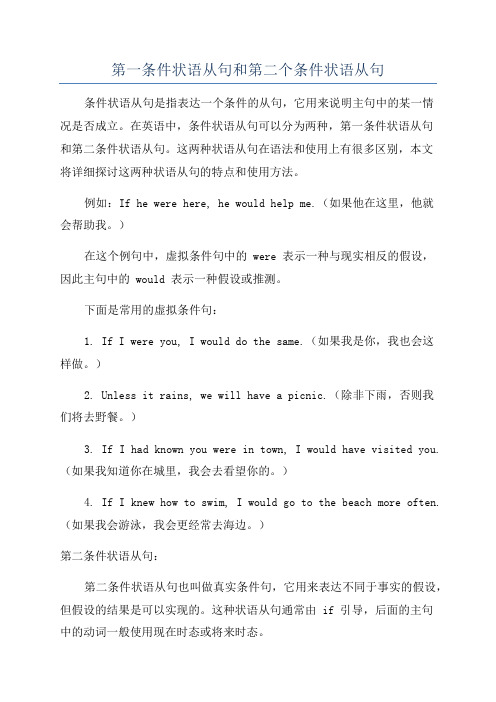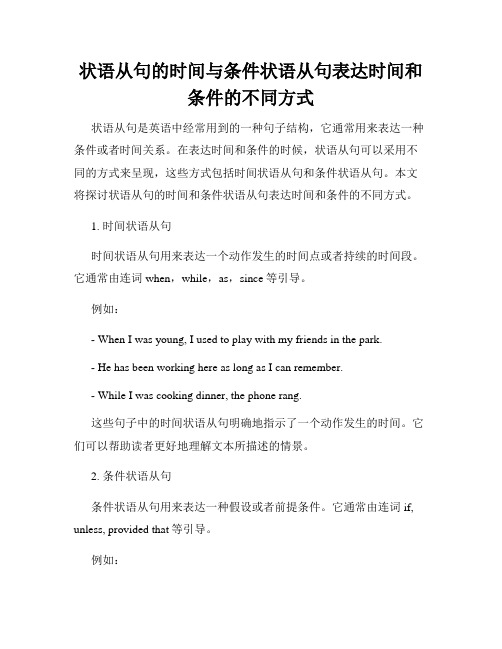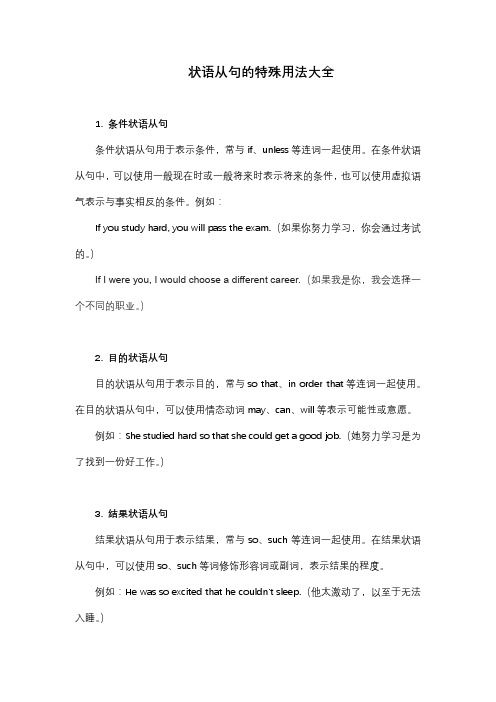状语从句2 条件状语从句
状语从句(9种

1.时间状语从句常用引导词:when, as, while, as soon as, before, after, since , till, until特殊引导词:the minute, the moment, the second, every time, the day,the instant, immediately , directly, no sooner … than, hardly …when, scarcely … whenI didn’t realize how special my mother was until I became an adult.While John was watching TV, his wife was cooking.The children ran away from the orchard(果园), the moment they saw the guard.No sooner had I arrived home ,then it began to rain.Every time I listen to your advice, I get into trouble.2.地点状语从句常用引导词:where特殊引导词:wherever, anywhere, everywhereGenerally, air will be heavily polluted where there are factories.Wherever you go, you should work hard.地点状语从句§4地点状语从句 (adverbial clause of place) 地点状语从句一般由连接副词where, wherever等引导,已经形成了固定的句型,例如:句型1:Where+地点从句,(there)+主句。
【注意】此句型通常译成“哪里……哪里就……”;主句在从句后面时,there可用可不用;如果主句在从句的前面时,一般都不用there。
第一条件状语从句和第二个条件状语从句

第一条件状语从句和第二个条件状语从句条件状语从句是指表达一个条件的从句,它用来说明主句中的某一情况是否成立。
在英语中,条件状语从句可以分为两种,第一条件状语从句和第二条件状语从句。
这两种状语从句在语法和使用上有很多区别,本文将详细探讨这两种状语从句的特点和使用方法。
例如:If he were here, he would help me.(如果他在这里,他就会帮助我。
)在这个例句中,虚拟条件句中的 were 表示一种与现实相反的假设,因此主句中的 would 表示一种假设或推测。
下面是常用的虚拟条件句:1. If I were you, I would do the same.(如果我是你,我也会这样做。
)2. Unless it rains, we will have a picnic.(除非下雨,否则我们将去野餐。
)3. If I had known you were in town, I would have visited you.(如果我知道你在城里,我会去看望你的。
)4. If I knew how to swim, I would go to the beach more often.(如果我会游泳,我会更经常去海边。
)第二条件状语从句:第二条件状语从句也叫做真实条件句,它用来表达不同于事实的假设,但假设的结果是可以实现的。
这种状语从句通常由 if 引导,后面的主句中的动词一般使用现在时态或将来时态。
例如:If it rains, we will stay indoors.(如果下雨,我们会呆在室内。
)在这个例句中,假设情况下的结果是可以实现的,因此主句中的will 也是一种现实和可能的表达。
下面是常用的真实条件句:1. If it snows tomorrow, I will go skiing.(如果明天下雪,我会去滑雪。
)3. If I get accepted to the university, I will study hard.(如果我被大学录取,我会努力学习。
状语从句与条件句的区别及用法解析

状语从句与条件句的区别及用法解析在语法中,状语从句和条件句是两种不同的句子结构,它们在用法上有一些明显的区别。
本文将对状语从句和条件句的区别进行详细解析,并提供一些使用状语从句和条件句的实例。
一、状语从句的定义和用法状语从句是一个从句,用来修饰主句中的动词、形容词或副词,并对其进行补充或限制。
状语从句通常由连词引导,如“当”、“虽然”、“因为”、“如果”等。
下面是一些常见的状语从句引导词:1. 时间状语从句:当、如果、直到、每次等。
例如:当我醒来时,天已经亮了。
2. 原因状语从句:因为、由于、既然、假如等。
例如:由于下雨,我没有去游泳。
3. 条件状语从句:如果、除非、只要、假如等。
例如:如果你来,我会很高兴。
4. 结果状语从句:所以、因此、以致、结果等。
例如:她很努力学习,所以成绩很好。
二、条件句的定义和用法条件句是一种句子结构,用来表示一个条件或假设,并在条件满足时提供特定的结果或后果。
条件句通常由连词引导,如“如果”、“除非”、“只要”等。
根据条件句的形式和含义的不同,条件句可以分为三种类型:真实条件句、虚拟条件句和非真实条件句。
1. 真实条件句真实条件句表示一个真实的条件和结果,通常用于描述普遍真实、可能发生的情况。
它的结构是:“如果+简单现在时,将来时”或“如果+一般现在时,一般现在时”。
例如:如果你学习努力,你将会取得好成绩。
2. 虚拟条件句虚拟条件句用来表示与事实相反或不可能实现的条件和结果。
它的结构是:“如果+过去时态,情态动词+动词的过去分词(用来表示过去的情况)或 would/could/might+动词原形(用来表示将来的情况)”。
例如:如果我是你,我会做出不同的选择。
3. 非真实条件句非真实条件句用于表示与现实相反或无法实现的情况,并且与过去事实无关。
它的结构是:“如果+过去完成时,情态动词+动词的过去完成时”。
例如:如果我早点到达,我就不会错过飞机。
三、状语从句和条件句的区别状语从句和条件句在用法上有以下几个明显的区别:1. 位置不同:状语从句可以出现在主句之前或之后,而条件句通常出现在主句之后。
状语从句的时间与条件状语从句的不同种类与用法

状语从句的时间与条件状语从句的不同种类与用法状语从句是指在句子中作为状语的从句,它可以用来修饰主句的动作或状态,起到进一步说明的作用。
其中,时间状语从句和条件状语从句是状语从句的两种常见类型。
本文将详细介绍状语从句的时间与条件状语从句的不同种类与用法。
1. 时间状语从句时间状语从句用来表示动作发生的时间,它可以在句子中起到连接前后句子的作用,使句子之间的关系更加紧密。
常见的时间状语从句有以下几种:(1)当...时/每当...此种形式表示一种经常性或者习惯性的动作或状态。
例如:每当下雨,他就会带上雨伞。
当他回来的时候,我们已经吃完晚饭了。
(2)一...就...一般用来表示动作的结果发生在主句动作之前,表示“一...就”的连续性。
例如:一有问题,他就会马上解决。
一哭,她妈妈就会抱她。
(3)从...开始/自从...表示从过去某个时间点开始一直持续到现在的状态或者动作。
例如:从去年开始,他就一直在全力以赴地工作。
自从他上了大学,他就变得更加独立了。
(4)直到...表示一直到某个时间为止。
例如:直到天黑了,他才回家。
昨天晚上我一直等他,等到半夜他才回来。
2. 条件状语从句条件状语从句用来表示某种条件下,结果会发生的情况。
它通常由if或者unless引导。
常见的条件状语从句有以下几种:(1)如果/假如...用于表示假设条件和假设结果,一种是真实条件,一种是虚拟条件。
例如:如果你去了,我就不去。
假如他是个好人,那就太好了。
(2)除非...表示某种情况下,只有在另一种情况下才会发生。
例如:除非你离开,否则我不会原谅你。
这个问题没有解决之前,除非你们努力,否则我们无法继续。
(3)只要/只有...表示某种条件满足时才会产生相应的结果。
例如:只要你开心,我就什么都愿意做。
只有付出努力,才会有收获。
总结:状语从句的时间与条件状语从句是日常生活和写作中经常使用的一种语法结构。
准确运用状语从句的不同种类与用法,可以使句子更加丰富多样,表达更加准确清晰。
状语从句的时间与条件状语从句表达时间和条件的不同方式

状语从句的时间与条件状语从句表达时间和条件的不同方式状语从句是英语中经常用到的一种句子结构,它通常用来表达一种条件或者时间关系。
在表达时间和条件的时候,状语从句可以采用不同的方式来呈现,这些方式包括时间状语从句和条件状语从句。
本文将探讨状语从句的时间和条件状语从句表达时间和条件的不同方式。
1. 时间状语从句时间状语从句用来表达一个动作发生的时间点或者持续的时间段。
它通常由连词when,while,as,since等引导。
例如:- When I was young, I used to play with my friends in the park.- He has been working here as long as I can remember.- While I was cooking dinner, the phone rang.这些句子中的时间状语从句明确地指示了一个动作发生的时间。
它们可以帮助读者更好地理解文本所描述的情景。
2. 条件状语从句条件状语从句用来表达一种假设或者前提条件。
它通常由连词if, unless, provided that等引导。
例如:- If it rains tomorrow, we will stay at home.- I will go to the concert with you, provided that I finish my homeworkin time.- Unless you study hard, you won't pass the exam.这些句子中的条件状语从句表达了一种可能的条件和其结果之间的关系。
它们可用于表达真实条件、虚拟条件或者可能性条件。
3. 表达时间和条件的其他方式除了时间状语从句和条件状语从句外,还有其他一些方式可以用来表达时间和条件的关系。
a) “when”和“if”引导的状语从句的省略在某些情况下,时间状语从句和条件状语从句的引导词可以被省略。
状语从句的特殊用法大全

状语从句的特殊用法大全1. 条件状语从句条件状语从句用于表示条件,常与if、unless等连词一起使用。
在条件状语从句中,可以使用一般现在时或一般将来时表示将来的条件,也可以使用虚拟语气表示与事实相反的条件。
例如:If you study hard, you will pass the exam.(如果你努力学习,你会通过考试的。
)If I were you, I would choose a different career.(如果我是你,我会选择一个不同的职业。
)2. 目的状语从句目的状语从句用于表示目的,常与so that、in order that等连词一起使用。
在目的状语从句中,可以使用情态动词may、can、will等表示可能性或意愿。
例如:She studied hard so that she could get a good job.(她努力学习是为了找到一份好工作。
)3. 结果状语从句结果状语从句用于表示结果,常与so、such等连词一起使用。
在结果状语从句中,可以使用so、such等词修饰形容词或副词,表示结果的程度。
例如:He was so excited that he couldn't sleep.(他太激动了,以至于无法入睡。
)4. 地点状语从句地点状语从句用于表示地点,常与where、wherever等连词一起使用。
在地点状语从句中,可以使用陈述句或虚拟语气,表示具体地点或可能性。
例如:Go where you want to go.(去你想去的地方。
)5. 时间状语从句时间状语从句用于表示时间,常与when、whenever等连词一起使用。
在时间状语从句中,可以使用一般现在时、一般过去时、将来时等表示具体时间或时间顺序。
例如:When you are ready, we can start.(当你准备好了,我们就可以开始。
)6. 让步状语从句让步状语从句用于表示尽管有困难或反对,但仍然坚持做某事。
第一条件状语从句和第二个条件状语从句
第一条件状语从句和第二个条件状语从句第一条件状语从句:
1. 如果明天下雨,我就不去跑步了。
2. 如果你不努力学习,就不可能考上理想的大学。
3. 如果你不去医院治疗感冒,病情只会变得更加严重。
4. 如果我有足够的钱,我就会去旅行。
5. 如果你不想被老板开除,就要努力工作。
6. 如果你不锻炼身体,就会变得越来越虚弱。
7. 如果你不好好吃饭,就会影响身体健康。
8. 如果你不尊重别人,别人也不会尊重你。
9. 如果你不停止抽烟,就会增加患肺癌的风险。
10. 如果你不重视学习,就会失去很多机会。
第二条件状语从句:
1. 只要我能掌握这门技能,我就能找到一份好工作。
2. 只要你肯努力,你就能考上理想的大学。
3. 只要你有耐心,你就能学会弹吉他。
4. 只要你愿意学习,你就会不断进步。
5. 只要你有信心,你就能克服困难。
6. 只要你有毅力,你就能完成自己的目标。
7. 只要你有坚定的信念,你就能战胜任何困难。
8. 只要你不放弃,你就有机会成功。
9. 只要你有追求,你就能创造出自己的价值。
10. 只要你能够认真思考,你就能找到解决问题的方法。
when引导的三种状语从句
when引导的三种状语从句一、时间状语从句1. When I was young, I used to play in the park every day.当我年轻的时候,我每天都在公园里玩耍。
2. When I wake up, the sun has already risen.当我醒来时,太阳已经升起了。
3. When he arrived at the station, the train had already left.当他到达车站时,火车已经开走了。
4. When it rains, I prefer to stay at home and read.下雨的时候,我更喜欢呆在家里看书。
5. When they were on vacation, they visited many famous tourist attractions.当他们度假的时候,他们参观了许多著名的旅游景点。
二、条件状语从句1. When you finish your homework, you can go out to play.当你完成作业时,你就可以出去玩了。
2. When it is sunny tomorrow, we will go hiking in the mountains.如果明天天晴,我们就去山里远足。
3. When you are in trouble, you can always count on me.当你遇到麻烦时,你可以始终依靠我。
4. When it rains heavily, we have to stay indoors.当下大雨时,我们不得不呆在室内。
5. When you have time, please call me.当你有时间的时候,请给我打电话。
三、原因状语从句1. When the weather is hot, people like to eat ice cream to cool down.当天气炎热时,人们喜欢吃冰淇淋来降温。
第二条件状语从句
第二条件状语从句第二条件状语从句是英语语法中的一种从句类型,用于表达一个条件,通常是与主句相反的条件。
下面是一些关于第二条件状语从句的例子:1. If I weren't so busy, I would go to the party tonight.如果我不是那么忙,我就会去参加今晚的派对。
2. If he didn't smoke so much, he would be healthier.如果他不那么抽烟,他会更健康。
3. If the weather weren't so bad, we could go for a walk.如果天气不那么糟糕,我们可以去散步。
4. If I had more money, I would travel the world.如果我有更多的钱,我会周游世界。
5. If he spoke English fluently, he could get a better job.如果他讲英语流利,他可以获得更好的工作。
6. If I didn't have to work tomorrow, I would stay up late tonight.如果我明天不用工作,我今晚会熬夜。
7. If she wasn't so shy, she would make more friends.如果她不那么害羞,她会交更多的朋友。
8. If I had known about the traffic, I would have left earlier.如果我知道了交通堵塞的情况,我会早点离开。
9. If we didn't live so far away, we could visit each other more often.如果我们不住得那么远,我们可以更频繁地互相拜访。
10. If the restaurant weren't so crowded, we could get a table.如果餐厅不那么拥挤,我们可以找到一个桌子。
英语状语从句的九种类型
英语状语从句的九种类型状语从句是英语语法中一个非常重要的部分。
它可以用来修饰主句的动词,形容词,副词等,从而使句子更加完整,更加准确。
在状语从句中,最常见的就是状语从句。
状语从句可以分为九种类型,分别是时间状语从句,条件状语从句,原因状语从句,目的状语从句,结果状语从句,让步状语从句,方式状语从句,比较状语从句和地点状语从句。
下面我们将对这九种类型进行详细的介绍。
一、时间状语从句时间状语从句用来表示主句中所描述的动作发生的时间,包括过去、现在和将来。
时间状语从句通常由时间连词引导,如when、while、as soon as、before、after、since、until、till等等。
例如:I will call you as soon as I arrive in Beijing.(我到北京后会立即给你打电话。
)He had finished his homework before he went to bed.(他睡觉前已经完成了作业。
)二、条件状语从句条件状语从句用来表示主句中的动作发生的条件或假设。
条件状语从句通常由if、unless、provided that、in case等引导。
例如: If it rains tomorrow, we will stay at home.(如果明天下雨,我们会呆在家里。
)Unless you study hard, you won't pass the exam.(除非你努力学习,否则你不会通过考试。
)三、原因状语从句原因状语从句用来表示主句中的动作发生的原因。
原因状语从句通常由because、since等引导。
例如:He didn't come to the party because he was sick.(他因为生病没有来参加聚会。
)Since it's raining outside, we can't go for a walk.(因为外面下雨,我们不能去散步。
- 1、下载文档前请自行甄别文档内容的完整性,平台不提供额外的编辑、内容补充、找答案等附加服务。
- 2、"仅部分预览"的文档,不可在线预览部分如存在完整性等问题,可反馈申请退款(可完整预览的文档不适用该条件!)。
- 3、如文档侵犯您的权益,请联系客服反馈,我们会尽快为您处理(人工客服工作时间:9:00-18:30)。
状语从句---条件状语从句(1)if 和unless 引导的条件状语从句。
if 表示正面的条件,意为“如果”;unless(=if---not )表示反面的条件,意为“除非,如果不”。
Eg. ①If you had come a few minutes earlier, you would have met him.②I may not come to see you recently unless I can complete the project ahead of time.(2)in case, on condition that, providing(that), provided(that), supposing (that), suppose(that )等词汇意思相近,意为“万一,假设,假如,在---条件下”。
①In case there is a fire, what will we do first?②Supposing/suppose(that)they refuse us, who else can we turn to for help?They agreed to lend us the car on condition that we returned it before the weekend.典例 The company promised to give us a discount we pay in advance.A.even ifB.as ifC. so thatD. provided that(3)as long as (=so long as )引导语气强烈的条件状语从句,意为“只要”。
Eg. I don't mind where you go, as long as you're back before midnight. (4)在“祈使句+and/or/or else/otherwise+陈述句”句型中,祈使句在意义上相当于条件状语从句。
Eg.①Run faster and you will catch the bus. =Work hard, otherwise you will fail.(5)if only”如果---就好了”和only if “只有”也可引导条件状语从句。
但是only if 置于句首时,主句用部分倒装。
Eg. If only I had a dog, I wouldn't be so lonely.Only if a teacher has given permission is a student allowed to leave the room.复习时要掌握条件状语从句的四大考点:(1)考查引导词。
只要弄清楚上下文的语义关系,并掌握引导词的意思,就能准确快速地写出答案。
(2)考查时态。
在含有条件状语从句的复合句中,主句若用一般将来时,从句往往用一般现在时表示将来。
(3)考查条件句中的虚拟语气。
条件句中的虚拟语气主要体现在if 型虚拟条件句和错综时间的条件句中。
①if 可引导真实的条件句,表示假设的情况有可能实现。
Eg. I will go out if it doesn't rain.② if 引导虚拟条件句,表示假设的情况很难实现或与事实相反。
(1)与现在事实相反,从句谓语动词用过去时(did/were), 主句谓语动词用would/should/could/might+do(2)与过去事实相反,从句谓语动词用过去完成时(had done),主句谓语动词用would/should/could/might + have done(3)与将来事实相反,从句谓语动词用should do/did/were to do ,主句谓语动词用would /should/could/might+doEg.① If I (be) ten years younger, I would start all over again.②If you (warn)him of the danger, he would not have been seriously injured.典例(2014.北京)We back in the hotel now if you didn't lose the map.A.areB. wereC. will beD. would be(2013.福建) --- Do you think George has passed the driving test ?---- No. If so, he his car to our college yesterday.A.would driveB. droveC. would have drivenD. had driven注意:在if 虚拟条件句中,如果要省略if, 必须把从句中的had, were,或should 置于句首,构成部分倒装。
Eg. 【①】Were I you, I would find a chance to make up with him. 【②】Had you had a deep communication with your mother, she would have supported you .【③】Should I have time, I would go and watch the football game.③If 引导错综时间的条件句在错综条件句中,条件从句和主句的谓语动词发生的时间背景不同,因此,条件从句和主句的谓语要根据谓语动作各自的时间背景选用不同的形式。
Eg. If I were you, I wouldn't have missed the film last night.If he had followed the doctor's advice, he would recover now.典例(2013.天津)If he had spent more time practising speaking English before, he able to speak it much better now.A.will beB. would beC. has beenD. would have been④含蓄条件句含蓄条件句中没有if 引导的从句来表示虚拟条件,其虚拟条件通常由without, but for, otherwise等引出或表示。
Eg. But for your help, we couldn't have succeeded. (=If it had not been for your help)典例(2013.安徽)I to my cousin's birthday party last night, but I was not available.A.wentB. had goneC. would goD. would have gone(4)省略形式如果条件状语从句的主语和主句的主语一致或从句的主语是it,且从句的谓语中有be 动词,可以把从句的主语和be动词一起省略。
另外还有一些省略后的固定短语,如if possible, if necessary, if not(如果不是这样), if so, if any (如果有的话)等。
Practice:填空题:(根据句意填写引导条件状语从句的连词)1.(2014.湖南改编)You will never gain success you are fully devoted to your work.2.(2013.重庆改编) we have enough evidence, we can't win thecase.3.(2012.福建改编) It is hard for the Greek government to get over the present difficulties it gets more financial support from the European Union.4.(2010.全国Ⅰ.改编) The little boy won't go to sleep his mother tells him a story.选择题:1.(2014.四川) I'll be out for some time. anything important happens, call me up immediately.A.In caseB. As ifC.Even thoughD.Now that2.(2012.江西) You can borrow my car you promise not to drive too fast.A.unlessB. even ifC. in caseD. as long as3.(2012辽宁)Leave your key with your neighbor you lock yourself out one day.A.as long asB. even thoughC. in caseD. as if4.(2014.湖南) If Mr Dewey present, he would have offered any possible assistance to the people there.A.wereB. had beenC. should beD. Was5.(2014浙江) They were abroad during the months when we were carrying out the investigation, or they to our help.6.(2014天津) the morning train, he would not bave been late forthe meeting.A. Did he catchB. Should he catchC. Has he caughtD. Had he caught7. (2013.重庆)---It rained cats and dogs this morning. I'm glad we took an umbrella.--- Yeah, we would have got wet all over if we .A.hadn'tB. haven'tC. didn' tD. don't8.(2012.安徽) Grace doesn't want to move to New York because she thinks if she there, she wouldn't be able to see her parents very often.A.livesB. would liveC. has livedD. were to live9.(2012.天津)We would have called a taxi yesterday if Harold usa ride home.A.didn't offerB. wouldn't offerC. hasn't offeredD. hadn't offered10.(2012.山东高考)If we adequate preparations, the conference wouldn't have been so successful.A.haven't madeB. wouldn't makeC. didn't makeD. hadn't made11.(2011.北京)Maybe if I science,and not literature then, I would be able to give you more help.A.studiedB. would studyC.had studiedD. was studying12.(2011.陕西)I through that bitter period without your generoushelp.A.couldn't have gone B didn't go C. wouldn't go D. hadn't gone 答案:填空题1-4 unless unless unless unless选择题1-5ADCBA 6-12DADDDCA。
